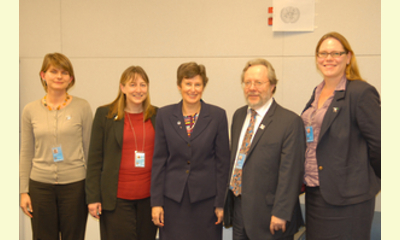|
|
Nations should step-up Humanitarian Disarmament
un articulo por Human Rights Watch
Governments should increase efforts to achieve strong disarmament initiatives driven by humanitarian concerns, Human Rights Watch and 30 other nongovernmental organizations said in a communiqué issued today.

A delegation of civil society representatives met with the United Nations High Representative for Disarmament Affairs Ms. Angela Kane to deliver the Communique from the Humanitarian Disarmament Campaigns Summit. © 2012 John Ennis
click on photo to enlarge
“All governments should step up their efforts to advance humanitarian disarmament and improve protection of civilians from the harmful effects of armed violence,” said Steve Goose, arms director at Human Rights Watch. “To succeed in this objective, civil society needs to be allowed to play a substantive role in the process.”
Some of the priorities for Human Rights Watch are to ensure that the prohibitions on antipersonnel mines and cluster munitions are respected by all, to strengthen weak international rules on incendiary weapons such as napalm and white phosphorus, and to stop the development of fully autonomous weapons – “killer robots” – that could select and engage targets without human intervention.
On the occasion of the 20th anniversary of the International Campaign to Ban Landmines, 90 representatives from nongovernmental organizations and coalitions gathered in New York City for a Humanitarian Disarmament Campaigns Summit convened by Human Rights Watch. These civil society representatives work in a variety of fields with the shared objective of protecting civilians from the harmful effects of armed violence.
The communiqué calls for strong disarmament initiatives driven by humanitarian concerns to strengthen international law and protect civilians.
“There is unfortunately no shortage of work needed to advance humanitarian disarmament,” Goose said.
Human Rights Watch is a founding member of the International Campaign to Ban Landmines, which received the 1997 Nobel Peace Prize together with its coordinator Jody Williams, for its efforts to bring about the Mine Ban Treaty and for its contributions to a new international diplomacy based on humanitarian imperatives.
|








|
DISCUSSION
Pregunta(s) relacionada(s) al artículo :
Can landmines be completely abolished,
* * * * *
Comentario más reciente:
:
This discussion question applies to the following articles:
12th Meeting of States Parties to the Mine Ban Treaty
Nations should step-up Humanitarian Disarmament
International Day of Mine Awareness and Mine Action
Dramatic drop in landmine casualties
Mozambique: Landmine Clearance Success Shows a Mine-Free World is Possible
Kofi Annan, Foreign Ministers Pledge Support for a Mine-Free World by 2025
Celebrating our success in 2016; Supporting ICBL-CMC Efforts in 2017

|
|









